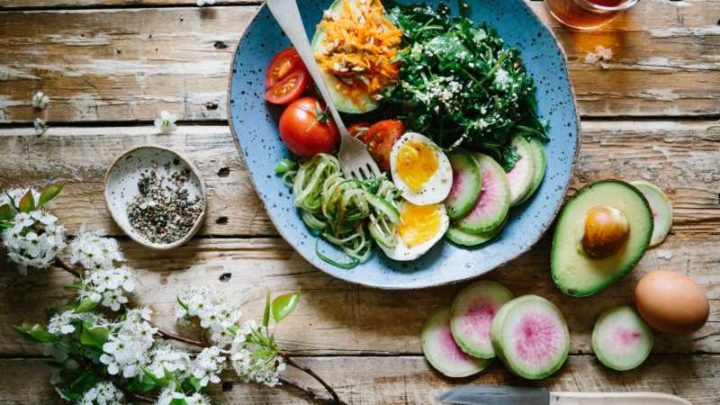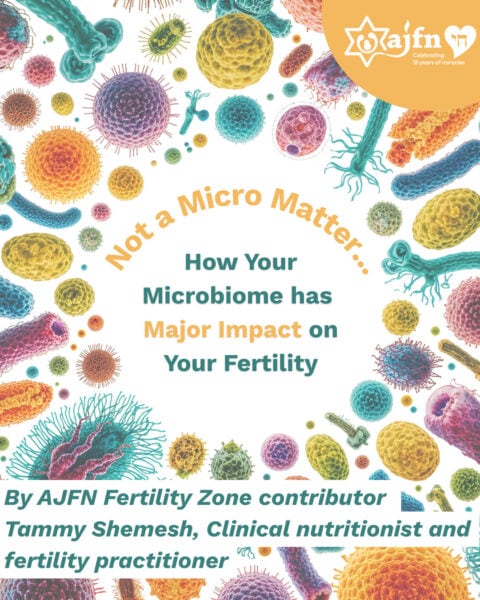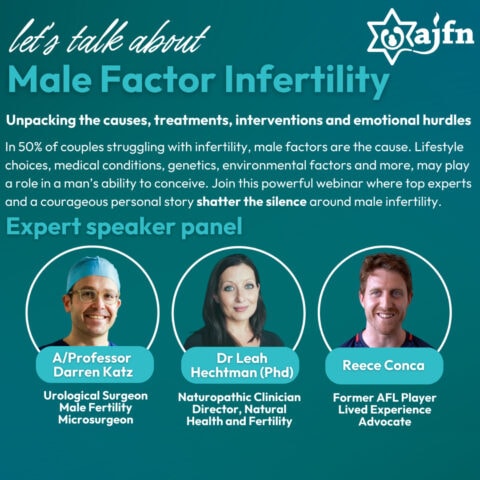By Aviva Romm, MD
If it’s taking longer than you thought it would to get pregnant, or if you’ve been told you have a fertility problem, or even if you have a ton of friends who have faced fertility challenges, you might be freaking out a little – or chances are, even a lot.
But please don’t lose hope or confidence in your body; there’s a lot you can do to supercharge your fertility – whether you’re still trying to conceive the ‘old-fashioned way,’ or you’ve started on a fertility treatment journey – and the most powerful place to start is with the foods you eat. In fact, I recommend all women – even if not planning to conceive for a year or more – follow an optimal fertility diet, as not only does it improve likelihood of conception, but it improves overall health for you and baby during pregnancy and beyond.
While fertility is complex, and every woman has her own journey, there is hope, and there are foods and nutrients you can use to nourish your ovaries and uterus, support immunity, reduce inflammation, and rebalance your hormones – all factors that can impact fertility, conception, and prenatal health. I’ve worked with women who have been trying to get pregnant for years, have ‘tried everything,’ and finally, it was these simple but effective dietary and nutrient shifts that seemed to help them conceive. (There are even a few little Avi’s and Aviva’s out there in the world of children, named after me by very happy parents.)
Nutrition Influences Fertility
There’s a wealth of data that shows our diets can make a powerful contribution to getting (and staying) pregnant. And while there are many reasons for fertility challenges, including PCOS, endometriosis, anovulatory infertility, and other causes, refining what you eat can have a profoundly positive impact on most root causes of fertility problems.
Here’s just a sample of the available research:
- A major study 39% of 5,598 first-time mothers in Australia, New Zealand and the United Kingdom, found that those who generally avoided fast food in their diets conceived within one month of when they began having unprotected sex, while women who included fast foods in their diets four times per week, had double the likelihood of still not having conceived at 12 months, compared to the no fast food eaters.
- Researchers from the Harvard School of Public Health monitored the fat consumption of 147 women undergoing IVF treatment and discovered that those who ate the highest amounts of monounsaturated fat were 3.4 times more likely to have a child after IVF. They concluded that avocados contain the best kind of monounsaturated fat while saturated fat was found to decrease the number of “good eggs.” Further, increased red meat consumption, greater than once weekly, is associated with longer time to conception.
- Nutritional status matters:
- Low ascorbic acid (vitamin C) is associated with reduced ovarian function and progesterone levels, consistent with a study that found that when women were supplemented with ascorbic acid, their progesterone levels rose, their luteal phases lengthened, and their pregnancy rates increased.
- Women with low B12 or low folate have an increased risk of recurrent miscarriage, as do women with hypothyroidism and PCOS, all of which are influenced by nutritional status.
- Low Vitamin E levels are connected with an increased risk of anovulation.
- Low Vitamin B6 has been found in women with miscarriage and prenatal nausea and vomiting.
- Vitamin D plays a role in helping women conceive after IVF.
- High homocysteine blood levels are associated with low folate/folic acid levels, low luteal phase progesterone, and a 33% increase in likelihood of anovulation, while higher levels of folate are associated with higher progesterone levels.
- Low selenium is associated with increased risk of miscarriage, possibly due to it’s importance for healthy thyroid function.
But the reality is, major studies have shown that most women in the US (and other countries) are chronically low in many of these nutrients. For example, most women go into their childbearing years low in:
- Protein
- B6
- Vitamin E
- Vitamin D
- Folate/Folic acid
- EFAs
- Iron
- Iodine
- Calcium
- Zinc
- Magnesium
How Does a Fertility Diet Work?
What we do – or don’t – eat influences your menstrual cycle regularity, ovulation egg quality, the health of you uterine lining, your immune system, and your gut and vaginal microbiome, for example, all of which influence fertility. The best foods for fertility provide the information your cells and endocrine system need to support conception and pregnancy and provide the essential building blocks of your hormones, while helping to ‘rebalance’ hormone imbalances, including insulin resistance, which for some is a ‘hidden’ cause of inflammation, ovarian dysfunction, PCOS, and fertility challenges.
In my medical practice, the optimal fertility diet is the foundation for all treatments; even when I’m offering an individualized approach, I guide my patients on the same core nutritional pathway. And as I explain to my patients, while nobody ever wishes to have a fertility problem, 50% of pregnancies in the US are unplanned meaning women don’t usually become pregnant with optimized nutrition. You’ll actually have an advantage on that – because you’re intentionally creating that healthier nutrient status that will benefit you – and your baby.
I’m going to show you which foods to add to your diet or emphasize if you’re already paying attention to eating healthy, and what supplements to add that really can make a difference not just in getting pregnant, but staying pregnant, having a healthy pregnancy, and optimizing your baby’s health.
What is an Optimal Fertility Diet
The Optimal Fertility Diet is based on the nutrition principles from the healthiest traditional diet in the world, the Mediterranean-style of eating – and includes all of the components that health experts agree on regardless of the diet camp they’re in:
- Whole fresh foods
- Plenty of vegetables and fruits – up to 8 servings daily
- Good quality protein especially fish eggs, and vegan sources like legumes
- Healthy oils and fats especially olive oil and avocados
- Nuts, and ample seeds
- Slow burning carbs in moderation
Here’s exactly what to eat – and what to skip, to optimize fertility – and pregnancy health, once you conceive:
Whole, organic foods
As a quick reminder, fast food consumption is related to lower fertility; in one large, study 39% of women who generally avoided fast food conceived within one month of starting to have unprotected sex, while women who included fast foods regularly in their diets had double the likelihood of still not having conceived at 12 months.
Power up with a plant-based diet, keep meat to a minimum
Harvard scientists, in the largest ongoing study of women’s health and their diets, found that increasing the intake of animal protein, even by as little as one serving a day, resulted in a 32% higher likelihood of ovulatory infertility. while, women who consumed less animal protein, and instead ate even slightly more plant-based protein (beans, legumes, nuts, seeds) had a 50% decrease in ovulatory infertility. Swapping even just 1 serving of animal protein for a serving of whole grain also reduced ovulatory infertility – this time by 43%.
Fatty fish help you get pregnant
From PCOS to endometriosis, ovulatory infertility to period problems, fatty fish improves gynecologic health and fertility. Just keep it to low mercury forms, and no more than 12 oz. weekly of recommended varieties.
Eat eggs
It’s no wonder eggs are a symbol of fertility. Eggs provide choline, essential for baby’s brain development, and eggs are an especially rich source. They’re also an excellent source of blood-sugar balancing protein and energy. Is eating two eggs daily too much? Absolutely not – there’s ZERO connection between eggs and heart disease. But even if you do eat two eggs a day, supplementing choline is important; and if you don’t eat eggs, it’s essential. I discuss this more under supplements.
Enjoy avocados – and other Healthy Fats
Did you know that just 2% of your total daily calories in trans-fats increases infertility risk by as much as 70%? That’s what researchers from the Harvard School of Public Health found in one of the largest prenatal nutrition studies to date. That’s the equivalent of just one small donut or a medium serving of fast-food fries. Healthy fats, on the other hand, improve insulin sensitivity, reduce inflammation, and support healthy cycles and fertility. These same researchers found that amongst women undergoing IVF treatment, those who ate the highest amounts of monounsaturated fats (found in olive oil, avocados, nuts and seeds) were 3.4 times more likely to have a child after IVF, compared to women who ate more saturated fats. They further concluded that avocados contain the best kind of monounsaturated fat for fertility – a great regular addition to your diet if you enjoy them.
Pass on the gluten
Celiac disease and possibly even non-celiac gluten intolerance, can affect fertility, increase miscarriage risk, and is associated with additional pregnancy complications; it also plays a role in endometriosis, leaky gut, and Hashimoto’s, all of which can impact fertility and pregnancy. So go gluten free – not only until you conceive – but at least until you’re a year postpartum, because gluten can also affect your thyroid postpartum, and this can contribute to challenges with milk production and also contribute to postpartum anxiety or depression.
Full fat dairy
Studies by Chavarro et al. initially showed that women who ate full fat dairy regularly (vs. low-fat) had greater likelihood of conception. It was initially thought that dairy was therefore important for fertility, however, subsequent studies but these same authors have suggested that it’s not the dairy itself, but getting both adequate fat and calcium in the diet that gave fertility a boost. Dairy in small amounts is part of a traditional Mediterranean diet, however, I generally recommend skipping the dairy because even organic dairy can have hormones that affect yours. Instead, I recommend ample daily intake of the other fats I discuss in this article, and ample dietary calcium intake from sources like tahini, lentils and garbazno beans, leafy greens, sardines, and other healthful vegan sources, with only occasional full fat organic dairy, no more than a couple of times/week.
Blood sugar counts
Blood sugar balance and insulin sensitivity are essential to healthy ovulatory function and fertility. Women with a diet high in processed, refined foods, have nearly twice the risk of ovulatory infertility as women with low glycemic loads, whereas a blood sugar balanced diet protects and enhances fertility, reduces inflammation, reverses the insulin resistance associated with PCOS, and has numerous other benefits that support healthy fertility. A diet with adequate good quality protein helps protect against insulin resistance. To eat for blood sugar balance, simply follow these simple steps:
- Don’t skip meals or let yourself get ‘hangry’
- At each meal, make sure you include a good quality protein source (legumes, beans, nuts/seeds, fish, poultry, less than once/week red meat is okay) + a good quality fat (avocado, olive oil, ghee) + a small amount of grain + your veggie serving. Even if you’re having something like oatmeal or another grain, add a protein + healthy fat.
- Avoid sugary foods and empty carbohydrates like cookies, cake, and white flour pastries that jack up your blood sugar after which it will drop, causing a blood sugar roller-coaster.
Drink more water
Drinking enough water can improve your quality and quantity of cervical mucus, reduces inflammation, is important for cellular health, and also prevents depression, fatigue, and keeps your brain sharper. Aim for 6-8 cups per day of water.
- Is my nightly glass of wine still ok? What about coffee? Interestingly, most studies have not found conclusive evidence that either a small occasional glass of wine, or even a cup of coffee now and then, interfere with fertility, though some small studies have found a little bit of connection. In one study, for example, women who consumed more than 100 mg of caffeine a day – the equivalent of 1 cup of premium coffee – were more likely to experience difficulty conceiving and higher rates of miscarriage during pregnancy. I recommend erring on the safe side and avoiding also avoiding both alcohol and coffee while trying to conceive, and I always advise avoiding both completely during pregnancy.
- Soft drinks pose a specific fertility risk. According to the Harvard Nurses’ Health Study, women who consumed 2 or more sodas a day were up to 50% more likely to experience ovulatory infertility than women who drank less than 1 soda a week.
Bump Up Your Nutrients
While ideally, we’d be getting all we need from our diet, numerous nutrients are needed in optimal amounts for yours and baby’s wellness, and as I mentioned, most women are going into their fertility years nutritionally depleted. Here are the supplements that can make all the difference. Don’t be overwhelmed by the number of nutrients you see – most of these are in a prenatal vitamin – and you can even get a great one-a-day so it’s not as much as it seems!
- Start taking a Prenatal Vitamin: All women trying to conceive should take a high quality, food-based prenatal vitamin and mineral supplement. Women taking a prenatal vitamin are more likely to get pregnant, which is associated with healthier pregnancies and lower rates of preterm birth, birth defects, and stillbirth. Unfortunately many prenatals fall short on bridging the phytonutrient gap and women’s actual preconception and prenatal needs, so check the label on the one you choose to make sure it includes the specific complement of the nutrients I describe below.
- Methylfolate and MTHFR: In this article I talk about the importance of methylation and the MTHFR gene for pregnancy health. During pregnancy folate plays a special role in the formation of baby’s chromosomes and nervous system formation, as well as mom’s health. Adequate levels improve egg quality, and prevent miscarriage and other pregnancy complications including preclampsia and placental abruption; it prevents neural tube and other defects in baby, and may protect against autism. For these benefits, you have to be taking it during the first 28 days of pregnancy. It also protects against prenatal and postpartum depression in mom. However, if you have the MTHFR gene, you can’t make full use of what you’re getting from your diet or the regular folic acid found in most vitamins. That’s why I put all women planning to conceive, or who are pregnant, on methylfolate, which everyone can metabolize, MTHFR gene or not. Dose: It’s typically recommended that sexually active women in their childbearing years take 400 to 800 mcg methylfolate daily.
- Vitamin B6 supports healthy levels of progesterone which creates a healthy uterine lining for implantation. Many women enter pregnancy low in B6, especially if they’ve been using hormonal contraceptives. It’s best to take the active form, Pyridoxal-5-phosphate (P5P),in a range of 5-10 mg per day. Going into pregnancy with adequate B6 levels may also prevent morning sickness (it can be supplemented at 50-100 mcg/day if you do get this common pregnancy symptom).
- Iron: In addition to plant-based sources of iron from your diet, a prenatal vitamin that contains 27 mg of iron reduces ovulatory infertility. Use iron chelate, which is a non-constipating form.
- Iodine is critical to your healthy thyroid function and therefore healthy menstrual cycles fertility, miscarriage, and stillbirth prevention. Once pregnant, it’s also critical to your baby’s thyroid, brain development, and central nervous system development. Even mild iodine insufficiency can affect your thyroid health and fertility, and deficiency is associated with reduced IQ and cognitive development in baby. Food sources include kelp and other sea vegetables, and seafood, as well as iodized salt. Your prenatal vitamin should contain a daily dose of 200 to 250 mcg of iodine. It’s important to note, however, that excess intake can cause thyroid suppressing in the baby, so if you’re taking an iodine supplement that exceeds the recommended amount (i.e., for natural thyroid treatment or breast health), decrease to the recommended dose once you start trying to conceive.
- Choline is essential for baby’s neurologic development and signaling, and cognitive function, especially memory, focus, and attention. Adequate intake may prevent birth defects and provides your child with stress resilience and protection from anxiety. While it can be obtained from the diet, many women’s diets fall short, especially if you don’t eat egg which is one of the primary sources aside from beef and calf liver (which I don’t recommend for any woman during preconception of pregnancy due to the high level of contaminants in organ means). Dose: 400 mg/day.
- Zinc is another important fertility nutrient. It plays a role in ovulation, supports healthy estrogen and progesterone levels, and is important for optimal immune function. It protects the developing egg against oxidative damage, supports healthy oocyte development, and is important for fetal brain development and function. Food sources: oysters, shellfish, seafood, beef, lamb, pumpkin seeds, and sesame seeds. Dose: your prenatal vitamin should supply between 15- 45 mg zinc daily.
- Omega 3 Fatty Acids play an essential role in conception, and the formation and development of the oocyte and embryo. Higher intake is associated with better ovarian reserve and higher rates of conception. Your intake of DHA prenatally is also critical for baby’s brain and neurological development, may prevent preterm labor, regardless of other risk factors, and interestingly, a couple of studies have shown that it can improve stress resilience, including to even severe social stressors, while EPA can prevent prenatal and postpartum depression. I recommend a combined dose of 2 g daily while you’re trying to conceive, and then taking a combined DHA/EPA, either from fish oil or a vegan source.
- Vitamin D plays a strong role in sex hormone production, and vitamin D is associated with improving fertility. It can reduce insulin resistance in women with PCOS and plays a role in preventing and treating fibroids and endometriosis. It promotes healthy follicle formation, and in studies of women undergoing IVF, women with higher vitamin D levels have not only pregnancy rates 35% higher, but higher quality embryos compared to those who are deficient. It also appears to prevent preterm labor. Food sources include fatty fish, eggs, and cod-liver oil. Sunshine is also an important source, but dietary sources and sunshine aren’t usually enough to meet fertility and pregnancy needs. Dose: the amounts in a prenatal vitamin are typically lower than needed, so a separate supplement is needed. For most women, 2000 iu daily will take care of deficiency, but it’s ideal to have your level checked and supplement accordingly, as women with a serum vitamin D level > 30 ng/mL have the greatest chances of getting pregnant,
- A probiotic may augment fertility, conception (including with IVF), and healthy pregnancy in a variety of ways. Disruption in the vaginal microbiome can favor the growth of organisms that interfere with fertility and increase pregnancy risk including miscarriage and preterm birth. Women undergoing IVF often have higher levels of BV and abnormal vaginal flora, which is now suspected to be a cause of the infertility that led them to treatment, and may also interfere with IVF success. Probiotics can also help reduce inflammation and regulate blood sugar, important in PCOS, endometriosis, and other conditions. Taking a probiotic containing a broad spectrum of Lactobacillus species may provide you with a fertility advantage; an added benefit is that taking a probiotic with Lactobacillus rhamnosus during pregnancy can also help prevent urinary tract infections, gestational diabetes, preeclampsia, as well as prenatal and postpartum anxiety and depression, and women who take a probiotic through the third trimester may help to prevent eczema, allergies, and asthma in their babies.
What You Can Expect
First of all, most statistically, it’s common for it to take 12 to 24 months to conceive, so I recommend not putting a label on yourself until at least 6 months of trying to conceive, though I ask my patients to give it 12 months of trying, because it really can take that long when following a natural, root-cause based approach to boosting or restoring fertility. There’s a 90 percent chance that most women will conceive in that time, and by optimizing your fertility it often takes far less. I’ve had patients in my own practice who’d been given an infertility diagnosis years prior, had tried everything, and became pregnant in months with a holistic approach – and without any medical fertility treatments. But a holistic approach can also include optimizing your diet – which has been shown to improve assisted fertility outcomes. It also not only improves your health now, but for the long run, so it’s a win-win.





